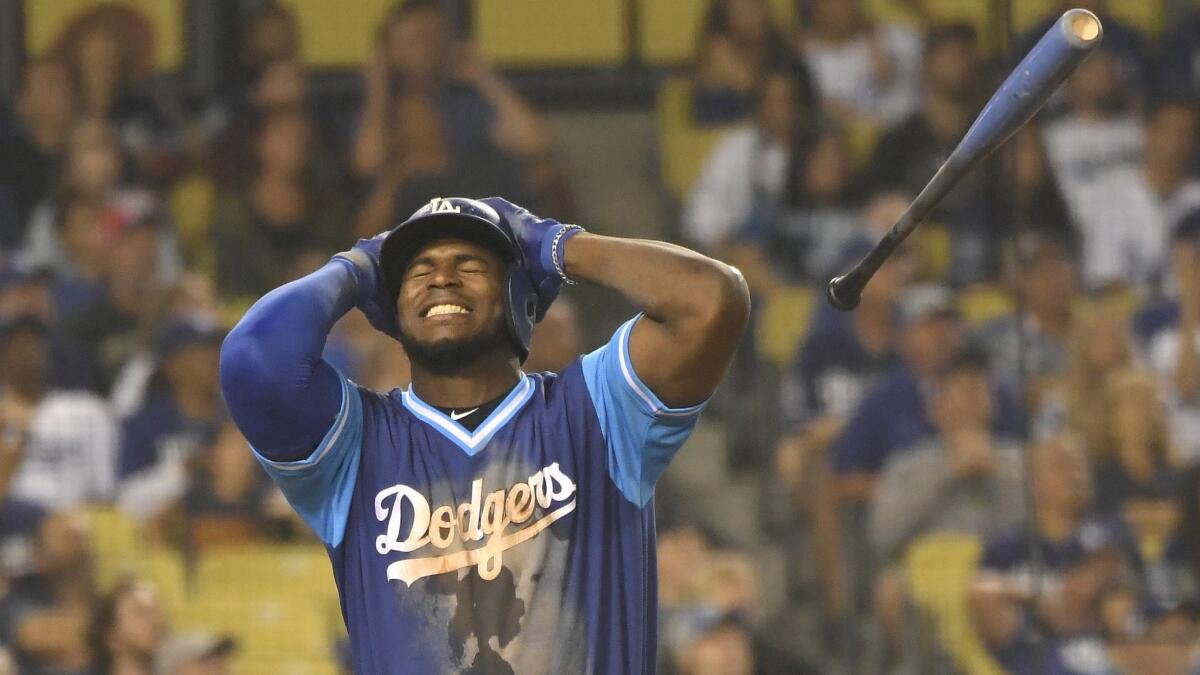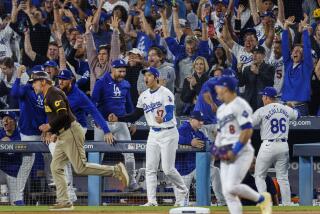Failure in the clutch has put the Dodgers in third place
The sequence serves as a snapshot to explain this troubling but still salvageable Dodgers season. In Saturday’s eighth inning, with the Dodgers aiming to expand their lead over San Diego, the lineup stoked the embers of a rally with a pair of singles. The defensive ineptitude of the Padres placed both runners in scoring position with no outs. Few scenarios are more ideal for an offense.
On the mound for San Diego was Trey Wingenter, a 24-year-old rookie making his eighth career appearance. He was not the one who looked overmatched.
To the plate came catcher Yasmani Grandal. He took a 97-mph fastball down the middle from Wingenter for strike one. He swung over a similarly located fastball for strike two. He flailed at another 97-mph heater, this one tailing up and out of the zone, for strike three.
Now it was up to utility man Chris Taylor. He met the same fate as Grandal. He fouled off a 97-mph fastball, a 98-mph fastball and a 99-mph fastball. When Wingenter tried a slider, Taylor’s bat touched only the air.
The last batter of the inning was Yasiel Puig. Wingenter did not change his pattern. He fired a 98-mph fastball, more or less over the heart of the plate. Puig popped up for the third out and dropped his bat in disgust.
An inning later, Kenley Jansen blew a save, which forced the game into extra innings, where the Dodgers eventually conquered their last-place foes. The extra play could have been avoided had the offense added to the lead. Their at-bats against Wingenter underscored a crucial aspect of this mystifying season: The Dodgers are one of the least clutch teams in baseball.
“We’ll score 10 runs one day, and then have a hard time the next day,” manager Dave Roberts said over the weekend. “Just looking for a little more consistency. And our guys understand that.”
As an article on FanGraphs by Jeff Sullivan detailed last week, the Dodgers are on pace for the fourth-worst clutch score since 1974. The statistic measures how hitters and pitchers perform in high-leverage situations, as measured by win-probability added. Much of the pitching issues stems from Jansen, who has given up home runs in each of his last three appearances.

The trouble with the offense is more widespread. As a group, the Dodgers ranked seventh in baseball with a .758 on-base plus slugging percentage heading into Monday’s games. Yet they rank 22nd in OPS with runners on base (.734), 16th in OPS with runners in scoring position (.743) and 23rd in high-leverage situations (.676).
It is not a coincidence that the team leads the majors with 123 solo home runs.
The trouble in high leverage spans almost the entirety of the lineup. Justin Turner has a .906 OPS — but a .701 OPS in high-leverage spots. The gap is similar for players like Cody Bellinger (.807 OPS vs. .622 in high-leverage), Grandal (.822 vs. .543) and Joc Pederson (.830 vs. .294). It is difficult to draw conclusions from such a small sample size — Bellinger leads the team with 69 plate appearances in high-leverage situations, a relative drop in the bucket over the course of the season. But those plate appearances mean more than others.
As the Dodgers regrouped from a sweep by St. Louis last week, the team pondered the source of its troubles. Roberts noted his team’s struggle adjusting with runners in scoring position, still searching to do damage rather than drive in runs. Andrew Friedman, the president of baseball operations, suggested an explanation went beyond the technical.
“As it’s happening more and more, I do think it starts to seep into guys’ conscious thought,” Friedman said last week. “And I think the best way to get out of it is to have amnesia, and not think back to what has happened, but to look forward. But obviously human nature is such that when something is more magnified, it ramps up the pressure in those situations.”
Turner did not disagree with the sentiment.
“I think offense is contagious,” Turner said. “You look at the way our offense has gone all year long. When it’s good early, it goes really good. And when there’s opportunities lost early in the game, it almost seems like it builds up, that anticipation, or that anxiety, in those at-bats as the game goes on.”
Turner was able to overcome any anxiety Sunday, when he drove in five runs as the Dodgers finished a sweep of the Padres. The victories allowed the Dodgers to cut their deficit in the National League West to 2½ games with 31 to play. The team still trails Arizona and Colorado heading into the final month of the season.
The team heads to Arlington, Texas, for two games against the last-place Rangers starting Tuesday. From there, they will host the Diamondbacks for four games on a home stand that ends with three games against the Rockies. The pressure will not cease anytime soon. The Dodgers understand they must fix this flaw in order to capture their sixth consecutive division title.
“It’s something that most guys in here are aware of, that we need to do a better job,” Turner said. “But I don’t think the recipe for that is to try harder. It’s to relax and not try to do as much.”
Twitter: @McCulloughTimes
More to Read
Are you a true-blue fan?
Get our Dodgers Dugout newsletter for insights, news and much more.
You may occasionally receive promotional content from the Los Angeles Times.









